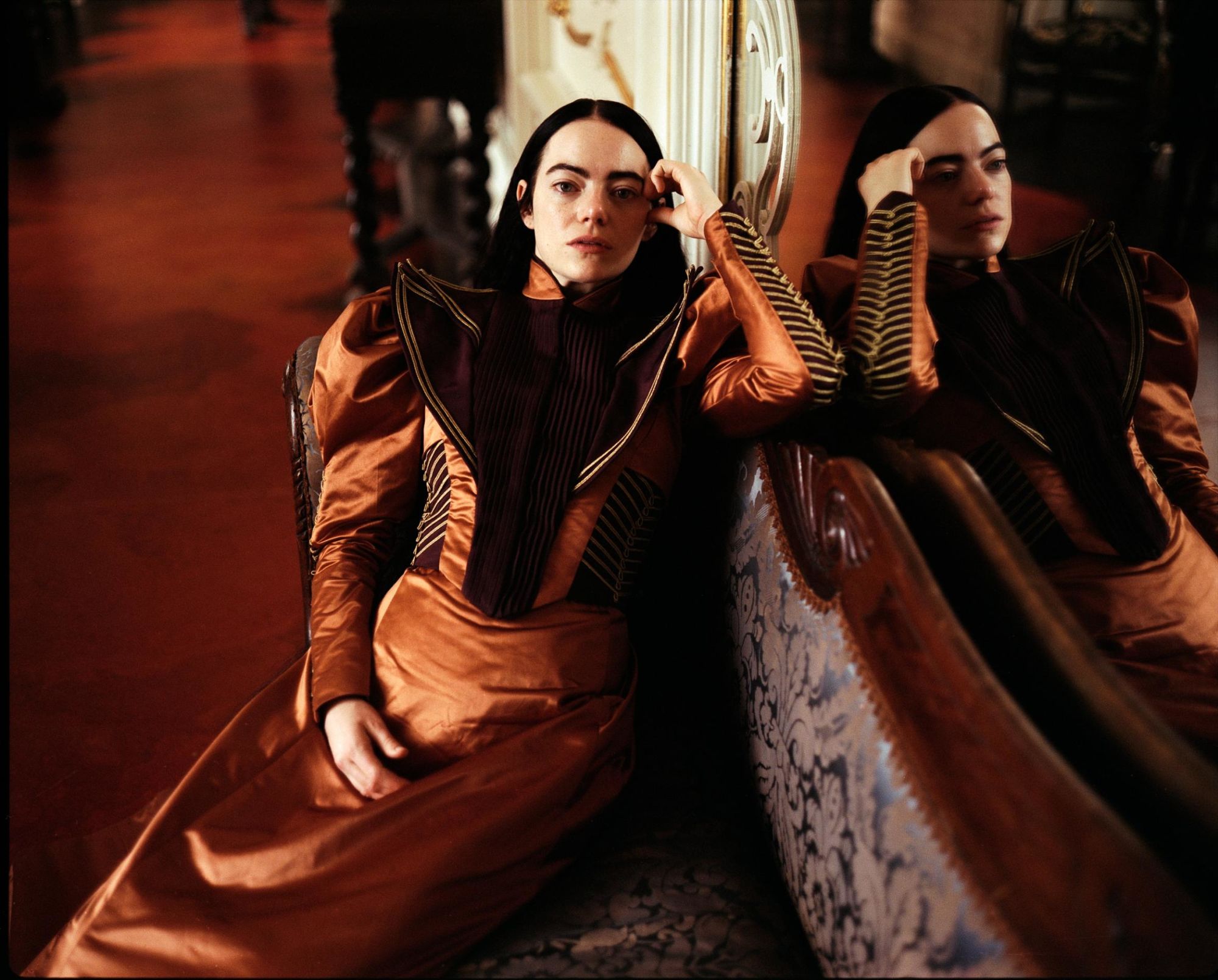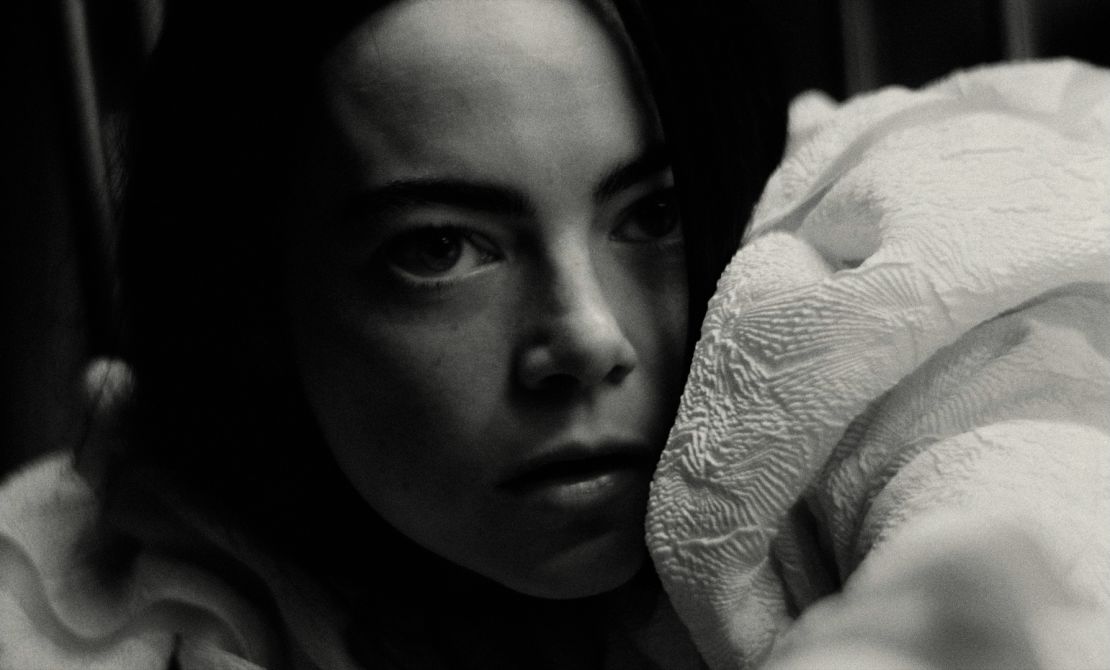Whatever Tony McNamara made from “Poor Things,” his son deserves a cut of dad’s check.
The Oscar-nominated screenwriter’s uproarious, frequently filthy adaptation of Alastair Gray’s novel about Bella Baxter, a deceased woman reanimated with the brain of an unborn child, is not short of quotable lines. But it’s hard to beat the time Bella, upon hearing a crying infant, stands up in the middle of dinner and announces, “I must go punch that baby.”
“It’s my favorite line,” McNamara told CNN – and he’s taking no credit for it.
“We were working on Bella – the young Bella -– and she was a bit nice,” he said. “And I was saying, ‘it’s weird, because kids aren’t like that.’” McNamara told his director Yorgos Lanthimos about a trip to a restaurant with his three-year-old son, who became irritated with one of its youngest customers. “Kids are just instinct. They’re like, ‘That’s annoying to me. I’m going to end it,’” the screenwriter recalled. Then the toddler came out with the obvious solution: “Let’s punch that baby.”
“Yorgos was like, ‘Okay, we need that spirit.’” It made it into the picture.
Their movie, a rambunctious picaresque indebted to Mary Shelley’s “Frankenstein” and Terry Gilliam’s worldbuilding, pairs rutting with ruminations on what it is to be alive in a society that seeks to put women in a box. In one sense, “Poor Things” is the horny cousin of Greta Gerwig’s “Barbie” – a similarly existential endeavour – but its daring and ambition eclipses that of the billion-dollar blockbuster. Winner of the Golden Lion at the Venice Film Festival, the movie is now rolling out its release worldwide with eyes firmly set on awards season.
Bella, played by a never-better Emma Stone, is the result of an experiment by Willem Dafoe’s Dr. Godwin Baxter, a maverick scientist living in a Victorian steampunk London. Bella’s lifeless body was found by Godwin in the river Thames and transplanted with the brain of a baby. A jolt of electricity later and a new life is born; and though brain and body are out of sync, Bella’s mind races out of infancy to catch up. Almost immediately she longs from freedom, and when the foppish Duncan Wedderburn (Mark Ruffalo) arrives at her door, enchanted by her beauty, she sees an opportunity for adventure.

Lanthimos had wanted to adapt Gray’s novel for years, but no one was interested in funding the project. Then he made “The Favourite” (2018); ten Oscar nominations later, “Poor Things” didn’t seem so unthinkable.
McNamara’s adaptation is a significant revision. The book is written as a series of letters by male characters in Bella’s life, whereas his screenplay allows Bella to claim her own narrative.
“We were always going to tell the movie as her movie, so that was a freedom, because I knew we would have to invent the journey to some degree, because it’s not all there,” said McNamara.
“I love every aspect of her,” Stone said of Bella. “The idea of a woman starting from scratch and being in love with all things that happen in life – the good and the bad. That she’s so fascinated by everything and hungry for experience, I think was really inspiring.”
Getting Bella up on her feet with her baby brain was challenging, but Stone said she couldn’t look to her own toddler for inspiration.
“Yorgos and I realised early on – Tony too -– that it wasn’t really comparable (to a normal child’s development)” she explained. “She’s already in a full-grown body, so it’s not like her bones are growing as she’s learning to walk … It was almost more like an invention, more robotic, staccato or strange.”
Ramy Youssef plays McCandles, Godwin’s assistant and Bella’s love interest, who’s tasked with monitoring her progress.
“She’s just on another level,” said Youssef of Stone. “She is so emotionally aware, the way she was tracking her character. The way that she was able to step into all different points of her character’s development, regardless of shooting order.”
Bella’s adventure makes its first stop in Portugal, before sailing across the Mediterranean to Alexandria, Egypt, and Paris. Running parallel is her own psychosexual odyssey.
Sex plays a large role in “Poor Things”: it’s one way Bella learns to understand her body – and how others covet it. What starts as an enthusiastic but queasily abusive first exposure when Bella’s mind is young (“Why do people not just do this all the time?” she naively asks) evolves into a more empowered state. There’s a sex-positive, third-wave feminism to her, taken to extremes when Bella learns she can profit from the activity she loves and turns to prostitution to fund her studies. “We are our own means of production,” she quips.
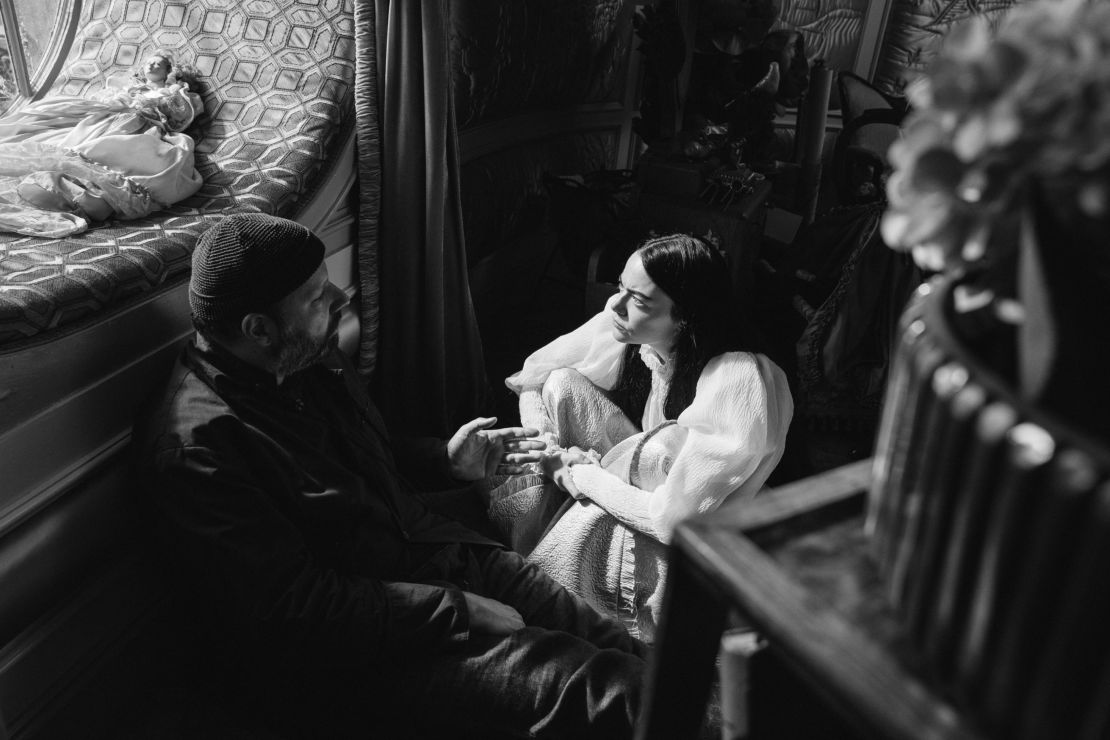
“Poor Things” serves a rebuttal to the argument sex scenes do not advance plots. McNamara, who also wrote “The Favourite” and “The Great,” is well positioned to weigh in.
“I have a simple approach to it: I’m never writing a sex scene,” he said. “I’m writing a scene that evolves characters and pushes story forward. If they have to be having sex for that to happen, then it’s a sex scene.
“The idea sexuality is not part of humanity and shouldn’t be shown – I don’t really understand that. It’s sort of disingenuous of an artist to be like that, and disingenuous of a society,” he added.
“So much trauma is rooted in our attitudes to it,” McNamara continued. “Obviously film and TV have certainly not helped that at times, but I think now the industry is very thoughtful about how all of that is done – and I think it should be. Yorgos and Emma make a good point: No one minds if you’re shooting someone in a film, and no one minds if the worst aspect of our humanity is (rated) PG. But a great aspect of our humanity, our sexuality, should not be seen? For us it’s like, ‘What?’”
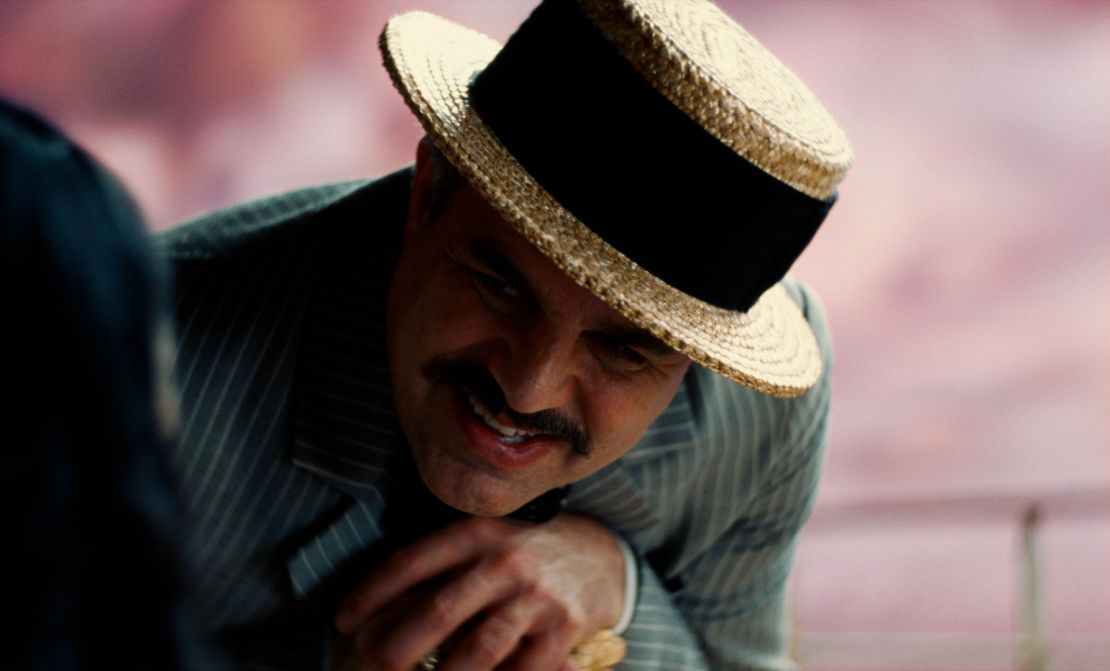
Bella attaches no shame to her sexual appetite, acting with a frankness that disarms her suitors. Stone’s performance furiously jumps two-footed into the notion, with graphic, often hilarious scenes at the expense of men – almost all of whom seek to control Bella.
Duncan Weddeburn is exhibit A: “He’s a classic rake,” said Ruffalo, jokingly referring to the character as “my id.”
“The stuff he says is so totally narcissistic … or just so flowery in its vulgarity,” he added. Yet when Bella publicly discusses sex in her own blunt terms, Duncan admonishes her, telling Bella, “You’ll confine yourself three phrases: ‘How marvellous;’ ‘Delighted;’ and ‘How do they make the pastry so crisp?’” (For which he promptly receives a slap.) Once Bella’s libido and intellectual curiosity outpaces Ducan’s, he quickly loses his grip on her.
The father figure of Godwin, who Bella refers to as “God,” is more complex but also controlling. Mutilated by his own scientist father, to Godwin, Bella is the child he couldn’t otherwise conceive.
“They’re beautifully written,” said Dafoe. “How he’s positioned in relation to Bella’s journey is interesting to me.”
“He doesn’t dwell on his victimization, his tragedy. He tries to turn it into something beautiful,” said the actor. “He’s kind of the shadow side of what happens to Bella – they’re both people that have been wronged.”
“He’s a man of science (and) he feels humiliated that he allows emotions to get involved,” Dafoe added. “He basically falls in love with her – not totally paternal(ly).”
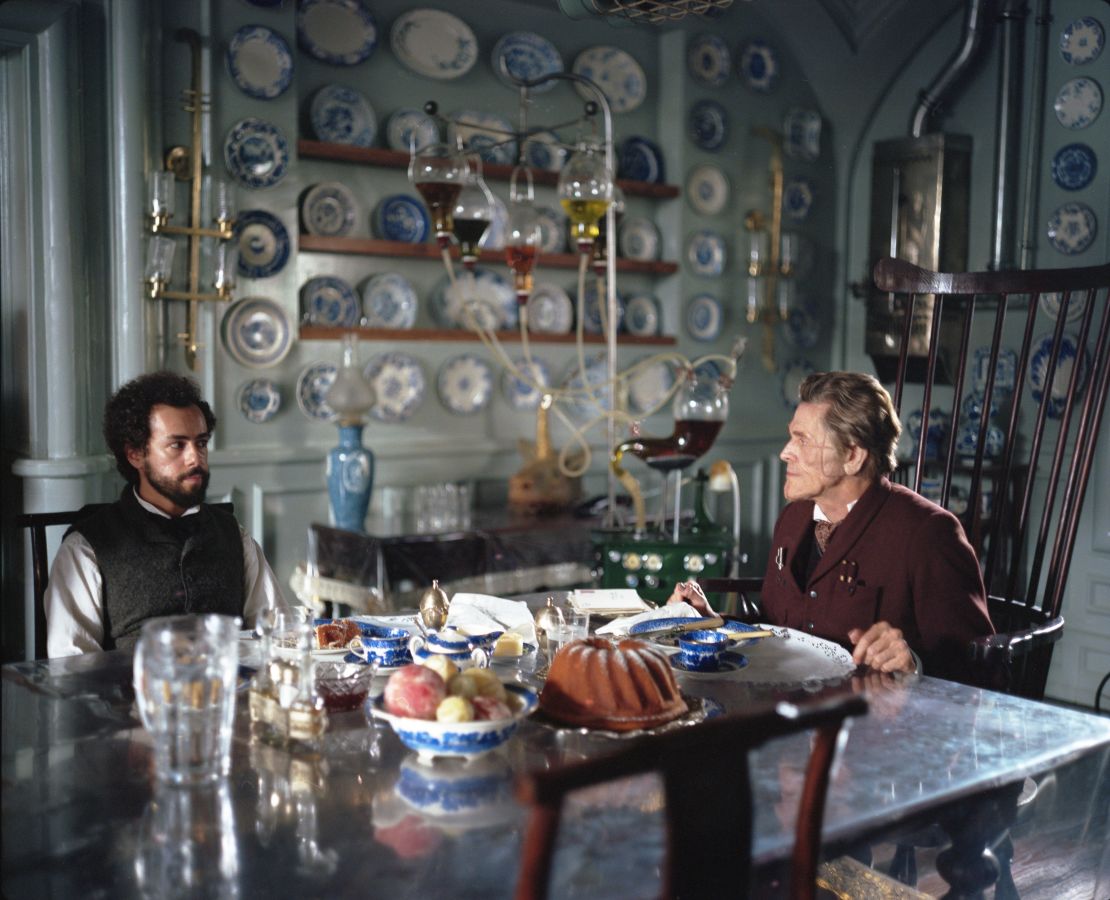
It’s hard for anyone in “Poor Things” not to fall for Bella, either for her beauty or, eventually, her brains. The film makes a virtue of Bella’s naivety, her mind first guilelessly holding up a mirror to social codes and behaviors, before she becomes more educated and starts to seriously interrogate them.
Gender dynamics are how the film’s politics announce themselves, but “Poor Things” is more than just a battle for female autonomy, suggested McNamara.
“Yorgos had this term, ‘We’re making a movie about the monstrosity that is society,’” said the screenwriter.
“We can’t leave a person alone to just experience their life in a liberated, curious way, and find their own path. That seems beyond us as human beings, as a society,” he added.
But the film also wants to have its cake and eat it. To take a Freudian view on events, Bella is born all id, growing to learn of then reject the superego imposed on her by society. Instead, she’s content to work on her ego – her “questing self” – with the ambition her personal growth can change society in the future. “If I know the world, I can improve it,” Bella confidently declares.

Sometimes it takes a monster to show us our faults; and though Bella is hardly the first in cinema to do so, Stone’s turn is an original one.
“At the time I said it was my hardest role to date,” said the actress, “which I kind of regret, because two years later, looking back at it, it was the most joyous role I’ve ever played.”
Towards the end of the film, Duncan Wedderburn, full of bile, screams at Bella she’s a woman with “a body that can’t be sated and a mind that picks people apart.”
It’s intended as an insult, though the film says otherwise. Ultimately, “Poor Things” says these qualities are not only to be celebrated, but they go hand in hand. “If I know the world, I can improve it” – the double entendre is no accident.
“Poor Things” receives a wide release in the US on December 22, and is released in the UK on January 12.
Additional reporting by Sandy Thin.


